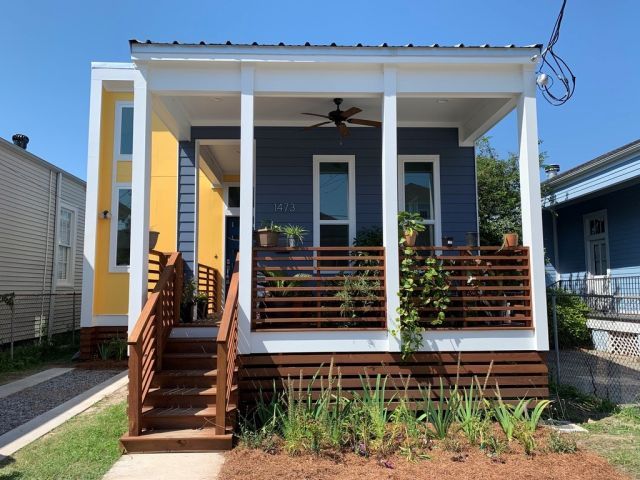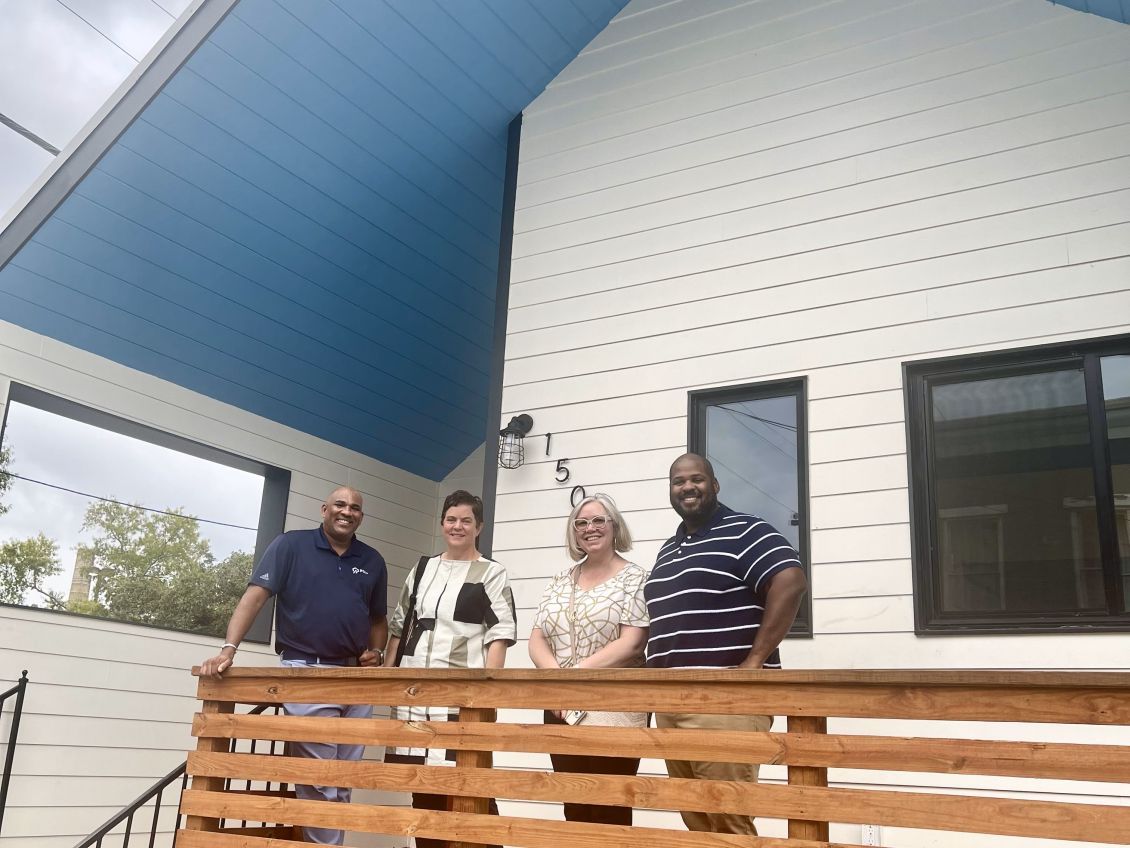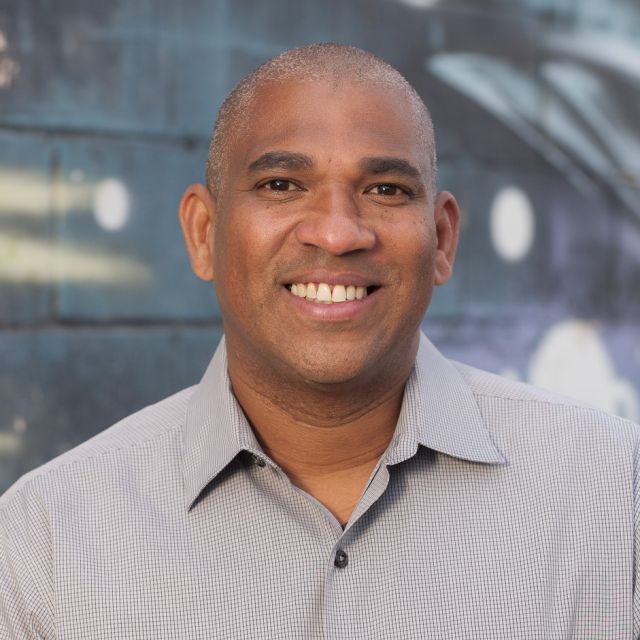Oji Alexander understands that homeownership is a key driver of wealth. He works to help Black families who have not had access to multigenerational wealth own energy-efficient, storm-resilient homes.
Alexander is the CEO of People’s Housing+ (PH+), a New Orleans-based nonprofit that seeks to address the city’s affordable housing crisis by advancing multi-generational wealth and combating systemic racism.
Before that, he worked at one of the three organizations that now make up PH+, leading the development and sale of more than 200 energy-efficient and storm-resilient homes, and putting more than 300 vacant properties back to use. Alexander serves on several boards – including the Enterprise Community Partners Community Leadership Council – and is a committed advocate for affordable housing.
He spoke with Enterprise about the importance of seeing homes beyond just physical assets, how green infrastructure can help New Orleans’s water challenges, and what keeps him motivated.
PH+ launched in 2023 following a strategic merger of three New Orleans-based community development organizations. This has allowed you to broaden your services, but how has your mission stayed the same?
Our approach always included energy efficiency with the goal of keeping people’s operating costs low. We build strong, efficient homes that don’t involve changing people’s lifestyles, but also result in lower operating costs.

We landed on this recipe of Low-E [low emissivity] hurricane-impact windows, really good insulation, and efficient HVAC systems. We’ve built to different energy-efficiency standards – Department of Energy, LEED, Green Communities, ENERGY STAR – but what we focused on was not the piece of paper or the certification.
It’s not just about houses, it’s also about families and making sure we remained a resource for them. And that is how we approach affordable housing to this day. It's more of a transformative than transactional approach.
The influx of federal funding through initiatives like the Greenhouse Gas Reduction Fund offers new opportunities. How are you approaching them in New Orleans?
We are really concerned about our city’s ability to absorb this capital and deploy it. We have great coalition groups, but they are all working independently of each other. And I think one of our big issues here is that we do not have the right convenor.
We also tend to rely on nonprofits for affordable housing, but we can’t be the only answer. The private market must play a role as well, and we must create a role for them.
You’ve mentioned recently strengthening the stewardship component. What is an example of that?
We transitioned from “We are here if you need us” to a more proactive approach, where we find the resources before people need them to mitigate problems like a foreclosure letter. We want to provide them with information and resources so they can make the best decisions for themselves and their families – and that extends into sustainability and climate resilience.
You told me that about 10 years ago, New Orleans started seriously grappling with water issues. As the city focused on municipal projects, you began incorporating green infrastructure into residential properties at no extra cost. What impact have you seen from those efforts?
We have been dealing with water the same way for 100 years and the only thing that changed is the size and number of pumps. That’s a losing proposition. We are built on a swamp, so we need to reduce the amount of hardscape we’re creating, take as much of that water that is falling on site, capture it, store it, and allow it to recharge the water table as opposed to letting it run into the water system.
We are going through an insurance crisis – on the Gulf Coast, and in Louisiana, specifically. Because of the sheer number of hurricanes, we have insurers that have gone belly up and will not write policies in our state. So we were thinking about how to mitigate that while all the legislative work was going on. We are building to FORTIFIED RoofTM standards. The program requires a series of upgrades to reduce the risk of storm damage, and we are going back and retrofitting.
Our homes have been through many storms, and we haven’t seen significant damages, and we know the utility bills are staying low. We’ve seen interest in green infrastructure and people willing to embrace it – not only to learn, but to become advocates.
And the sheer number of people who are still in homes that we’ve built – it’s got to be close to at least 75%. And those who aren’t, sold them. When folks are moving and selling because they earned equity and are coming out on the plus side, we know we are building wealth in our community.
Due to systemic racism and lack of generational wealth in many Black communities, homeownership remains difficult for many families you want to serve. How do you ensure you reach them?
I’m a product of generational wealth so I know how it works and how it’s a matter of being able to connect that to resources. My parents owned their home, and their parents owned their home.
But African-American families generally start the homeownership journey much later than their white counterparts, and that is a contributing factor to the wealth gap. Black families needed time to save up, but by the time they were ready, the houses were gone. So we shifted our pre-sales model so that it allowed us to work with those families.
We have a few hundred people in the pipeline. Some are mortgage-ready and some are just starting. It allows us to cultivate buyers and provide support and resources so when they become mortgage-ready, we can pull people out of the pipeline and direct them to our houses.
From limited funding to growing demands created by climate change, there is no shortage of challenges in affordable housing. What keeps you motivated?
This work is hard, and what keeps me going is knowing there are unbelievable leaders and practitioners out there and we are not alone.
And we maintain relationships with our homeowners. I recently bumped into the first person we put into a home in 2008, when I started doing this work. We chatted at the grocery store, and he ended with, “I have to go home and make dinner.”
The notion that 16 years later, he’s going to his house and making dinner means we did what we intended to do: we built homes for people like him, so they could get back to living after Hurricane Katrina.
Vesna Jaksic Lowe is an award-winning journalist. This profile is part of our series, The Resilient 7, celebrating leaders building a more sustainable future. Read more articles from the series:
- Bomee Jung: Helping Housers Build Resilient Homes
- Gina Ciganik: Deploying Science to Create Healthier Buildings
- Luke Ilderton: A Passion for Equitable Decarbonization
- Joseph Kunkel: Advancing Resilience Through Holistic Design in Indian Country
- Anne Evens: How Clean Energy Drives Climate and Racial Justice
- Monica Mejia: Going All Electric on L.A.'s Eastside
Learn how Enterprise is making sure no community is left behind in the green energy transition.

